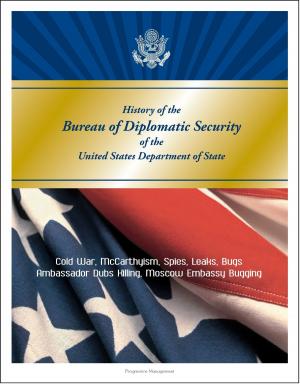Eisenhower: His Model of Shared War Powers, Strategic Operator and Leader, Cultivating Strategic Thinking, Negotiating War Powers with Congress
Nonfiction, History, Military, Strategy, World War II| Author: | Progressive Management | ISBN: | 9781370369003 |
| Publisher: | Progressive Management | Publication: | March 16, 2017 |
| Imprint: | Smashwords Edition | Language: | English |
| Author: | Progressive Management |
| ISBN: | 9781370369003 |
| Publisher: | Progressive Management |
| Publication: | March 16, 2017 |
| Imprint: | Smashwords Edition |
| Language: | English |
This report has been professionally converted for accurate flowing-text e-book format reproduction. This collection reproduces several interesting reports: The Eisenhower Model Of Shared War Powers; Eisenhower, Strategic Operator and Leader; and Cultivating Strategic Thinking: The Eisenhower Model.
The final months of Eisenhower's first administration confirmed his conviction that international communism was a dangerous threat to U.S. national interests, particularly in the Middle East. President Gamal Abdel Nasser of Egypt engaged in East-West political maneuvering during 1956 to secure arms and financing for the Aswan High Dam project, eventually accepting Soviet assistance. When Nasser nationalized the Suez Canal in July 1956 to raise revenues for his dam project, Britain and France, in cooperation with Israel, intervened militarily before accepting an inconclusive, U.S.-sponsored United Nations cease-fire. The impotent Franco-British intervention and withdrawal left a power vacuum in the Middle East which President Eisenhower believed would be exploited by the Soviet Union. Its brutal suppression of political uprisings in Poland and Hungary, combined with Egypt's new status as a Soviet client, convinced President Eisenhower that the United States needed to act fast or risk Soviet hegemony in the region. He appeared before a joint session of Congress on January 5, 1957 to request approval of the Middle East Resolution. House Joint Resolution 117 was the product of executive/legislative cooperation that would authorize the president to use armed forces to assist any nation or group of nations requesting assistance against armed aggression from any country controlled by international communism. Identifying communist aggression in the Middle East as a major threat to U.S. national security gave President Eisenhower the foreign policy initiative, highlighted the potential need for military intervention, and alerted the Joint Chiefs of Staff to begin preparing for contingencies in the Middle East. Having alerted Congress and the nation to the strategic threat of communist aggression, President Eisenhower applied his personal style of bipartisan political leadership to ensure successful passage of the Middle East Resolution.
This report has been professionally converted for accurate flowing-text e-book format reproduction. This collection reproduces several interesting reports: The Eisenhower Model Of Shared War Powers; Eisenhower, Strategic Operator and Leader; and Cultivating Strategic Thinking: The Eisenhower Model.
The final months of Eisenhower's first administration confirmed his conviction that international communism was a dangerous threat to U.S. national interests, particularly in the Middle East. President Gamal Abdel Nasser of Egypt engaged in East-West political maneuvering during 1956 to secure arms and financing for the Aswan High Dam project, eventually accepting Soviet assistance. When Nasser nationalized the Suez Canal in July 1956 to raise revenues for his dam project, Britain and France, in cooperation with Israel, intervened militarily before accepting an inconclusive, U.S.-sponsored United Nations cease-fire. The impotent Franco-British intervention and withdrawal left a power vacuum in the Middle East which President Eisenhower believed would be exploited by the Soviet Union. Its brutal suppression of political uprisings in Poland and Hungary, combined with Egypt's new status as a Soviet client, convinced President Eisenhower that the United States needed to act fast or risk Soviet hegemony in the region. He appeared before a joint session of Congress on January 5, 1957 to request approval of the Middle East Resolution. House Joint Resolution 117 was the product of executive/legislative cooperation that would authorize the president to use armed forces to assist any nation or group of nations requesting assistance against armed aggression from any country controlled by international communism. Identifying communist aggression in the Middle East as a major threat to U.S. national security gave President Eisenhower the foreign policy initiative, highlighted the potential need for military intervention, and alerted the Joint Chiefs of Staff to begin preparing for contingencies in the Middle East. Having alerted Congress and the nation to the strategic threat of communist aggression, President Eisenhower applied his personal style of bipartisan political leadership to ensure successful passage of the Middle East Resolution.















